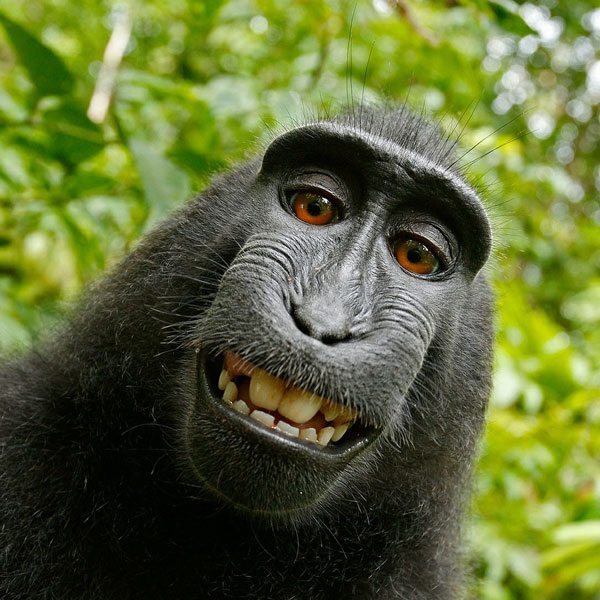
April 23, 2018; Washington Post and the Hollywood Reporter
After several years of strange litigation, the case of Naruto the crested macaque and the nonprofit-backed copyright claim over his photographed image has reached its likely end. On Monday, the US 9th Circuit Court of Appeals upheld the ruling of a lower court that dismissed the lawsuit filed by People for the Ethical Treatment of Animals (PETA), on the grounds that “U.S. copyright law does not allow lawsuits that seek to give animals the rights to photographs or other original work.”
We last looked in on this story in September 2017, when Lou Altman covered the settlement reached between PETA (on behalf of Naruto) and photographer David J. Slater. At that time, Slater “agreed to donate 25 percent of any future revenue from the images to charities dedicated to protecting crested macaques in Indonesia.” However, the question of whether Naruto, as the one who triggered the camera and thus took the picture, was entitled to claim copyright over his image had taken up enough of the system’s time and was in sufficient legal doubt that the appellate court, rather than simply dismissing the case following the settlement, chose to render a decision.
“We must determine whether a monkey may sue humans, corporations, and companies for damages and injunctive relief arising from claims of copyright infringement,” writes Circuit Judge Carlos Bea. “Our court’s precedent requires us to conclude that the monkey’s claim has standing under Article III of the United States Constitution. Nonetheless, we conclude that this monkey—and all animals, since they are not human—lacks statutory standing under the Copyright Act.” As for PETA, the Court found that the group “failed to establish that it had a significant relationship” with Naruto the monkey and so was not his legal “next friend.”
Sign up for our free newsletters
Subscribe to NPQ's newsletters to have our top stories delivered directly to your inbox.
By signing up, you agree to our privacy policy and terms of use, and to receive messages from NPQ and our partners.
Jeff Kerr, PETA’s general counsel, said in a statement, “Denying [Naruto] the right to sue under the US Copyright Act emphasizes what PETA has argued all along—that he is discriminated against simply because he’s a nonhuman animal.” However, Circuit Judge N. Randy Smith writes in his concurrence, “It is clear: PETA’s real motivation in this case was to advance its own interests, not Naruto’s.”
Kerr says that PETA is still considering its next move, but in the face of what amounts to a smacking-down by the court, perhaps wisdom should be found in a Polish dismissal that’s gained popularity lately: “not my circus, not my monkeys.”—Jason Schneiderman
Editor’s note: Although the gender of the crested macaque in the photograph is in some dispute, the news coverage uses male pronouns for Naruto, and so do we.













